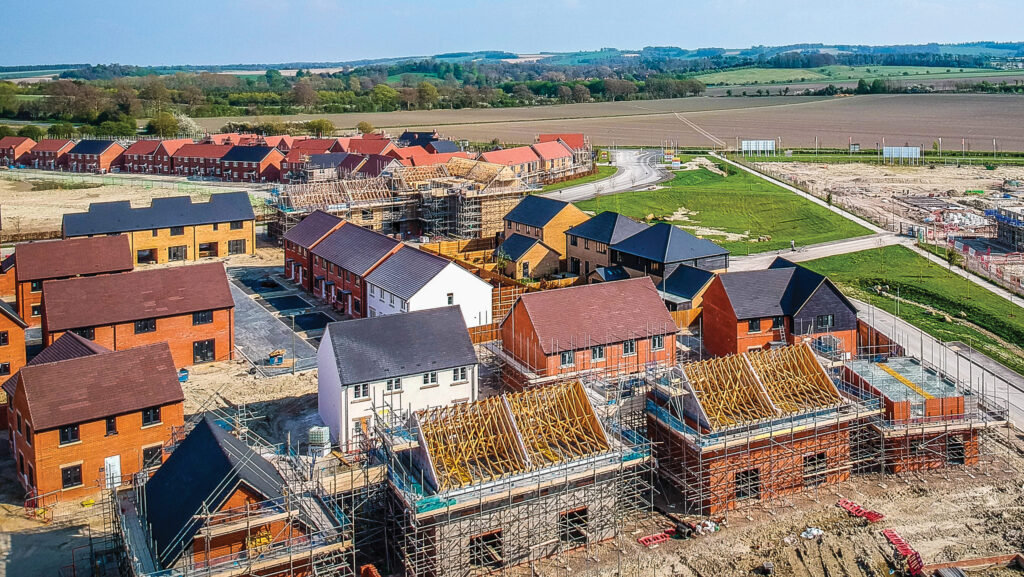Planning bill set to change environmental markets for farmers
 © Adobe Stock
© Adobe Stock Aiming to deliver a boost in housing construction and infrastructure projects such as roads and railway lines more swiftly, the Planning and Infrastructure Bill introduced last week proposes an entirely new approach to addressing the environmental impact of development.
This will be achieved by developers paying a levy into a Nature Restoration Fund managed by Natural England.
Natural England will in turn draw up environmental delivery plans (EDPs) to provide mitigation to offset development impacts on habitats and species and to deliver environmental improvements on a large scale.
See also: Clean power push brings grid reform and shifts site demand
Frustratingly for those advising both landowners and developers, much of the detail as to how the new system will work is yet to come, in the form of regulations and guidance.
Conservation measures at scale
The government says the new approach means more for nature, not less.
Rather than addressing the impact of a single development, as is currently the case, an EDP will pool resources and deliver conservation measures at scale, also securing secondary benefits like public access to green spaces, says the Ministry of Housing, Communities and Local Government.
Farmland will be needed to provide much of this mitigation, so landowners are likely to be approached by Natural England for this in areas where an EDP applies.
One of the main issues is phosphate and nitrogen pollution of river catchments and protected sites, which has been growing in recent years and is currently being addressed through a system of nutrient credits.

© Istockphoto
These credits are created by pollution mitigation measures being implemented often on farmland but also in relation to rural properties with private sewerage systems, and away from the development sites in question.
For example, measures can include reducing livestock numbers or destocking altogether, also installing more efficient private sewerage systems known as package treatment plants.
Developers buy these credits in private markets, which have evolved over the past few years, in areas where there is a legal requirements to mitigate as part of a planning consent.
Currently this is the case in 74 local planning authorities for nutrient pollution mitigation.
Statutory nutrient mitigation credits are also available to buy from Natural England for the Tees and Poole Harbour catchments, often created through agreements with wildlife trusts and private landowners.
Issues for landowners
It is estimated that it will take between one and two years for the Planning and Infrastructure Bill to become law, with the private market continuing to provide the mitigation in the meantime.
However, it is not clear whether it will be allowed to continue to operate in areas covered by EDPs once the Nature Restoration Fund is established, and what the introduction of EDPs will do to the value of payments to landowners.
Private markets are delivering the measures needed, argue those involved. Many planning advisers fear the EDP system will take too long and be too cumbersome, with some concern that the environment could lose out.
Unless a private market exists alongside the Nature Restoration Fund payments, it will be difficult to establish the correct charges to developers, say advisers.
Ben Sharples, partner and head of natural capital at law firm Michelmores, says: “EDPs will have to be costed which is going to be an educated guess at best. If those sums are not correct then the environment could be short changed.
“The private markets which are already in place leave the environment in the best position as any shortfall must be met by the landowner.”
The reference to landowners meeting the shortfall relates to the legal structure currently in place whereby landowners, for a payment by the developer, undertake long-term agreements to deliver the mitigation measures.
Bureaucracy and cost
Broker Hugh Townsend of Townsend Chartered Surveyors runs regular private market tenders for nutrient mitigation credits and other environmental measures.
He says the proposals look more bureaucratic and more expensive than the existing private market route.
For Hugh, the big questions include, in an area covered by an EDP, whether a landowner will still be able to sell and a developer to buy privately, as well as what will the EDPs cost to develop, what rates will developers have to pay to the Nature Restoration Fund, and how will that be determined.
“This way [through the Planning and Infrastructure Bill] the developer can get their ticket before the mitigation measures are in place,” says Hugh.
“Someone is still going to have to do an initial survey of the development site, will that be the developer or Natural England?”
Environmental Farmers Group (EFG) is a farmer-owned and farmer-led cooperative providing natural capital services such as nutrient neutrality credits and BNG units for sale in private markets.
It currently has membership and interest from 460 farmers over 257,000ha across six areas in England
Digby Sowerby is operations officer at Natural Capital Advisory, a subsidiary of the Game and Wildlife Conservancy Trust which advises EFG on the sale of natural capital goods.
“We are working closely with the new government to make sure the design of the new policy is accessible for farmers by demonstrating that farmers can deliver changes strategically and at fair value through the co-operative model,” he says.
Big task for Natural England
Planning lawyers point out that the proposals represent a huge task for Natural England.
At law firm Freeths, director Richard Broadbent says getting this new approach off the ground will be a massive challenge, needing a big increase in Natural England’s budget if a lengthy delay is to be avoided in bringing EDPs into being.
Natural England’s budget is already under pressure, says Richard, and under the bill’s proposals it will need to:
- Find out what development is forthcoming
- Assess the impacts of that development on both protected sites and species
- Decide how those impacts should be addressed through environmental measures
- Consult on and draft the new Environmental Delivery Plans
- Have those plans approved by the secretary of state
- Implement the plans
- Monitor the plans
The government is introducing a two-tier approach to environmental protection, he says.
That is, existing nature law standards will continue to apply to development not covered by the new EDPs and a more relaxed approach to environmental protection for those developments which will in due course be covered by these plans.
“There will be many people in the environmental sector who will be concerned that this two-tier approach will weaken existing environmental standards and oversimplify matters which are far from simple,” says Richard.
Contrasting approaches in and outside EDPs
Ben Sharples of Michelmores also points out that an EDP can be revoked if it no longer passes an “overall improvement test.”
“This means an EDP could be scrapped halfway through if the conservation measures are unlikely to be sufficient to outweigh the negative effect of the development.
“This is not an option with private market approaches like nutrient neutrality where the commitment is made at the outset and has to be honoured.”
The proposed approach seems entirely contradictory to the government’s desire to encourage the development of private markets, says Ben.
He points out that the nature restoration levy calculation takes into account not only the cost of delivering the mitigation measures but also the economic viability of a development, which in turn can be assessed by taking into account the imposition of the levy.
“This would appear to allow Natural England to set lower levy rates if realistic ones would have made the development unviable. Many would regard this as looking through the wrong end of the telescope.”
Complexity
“It just gets ever more complicated,” says Rob Atkin-House, planning partner with law firm Maples Teesdale.
“Natural England will have to recruit an entire team to get this in place. It will have to consult on these EDPs before they are formally adopted, and it could find developers trying to give it money before Natural England is ready.”
The future of private markets depends on how quickly the new system comes into being, says Rob, who thinks that both may run in parallel.
The draft bill also gives Natural England compulsory purchase powers, although advisers are sceptical about the extent to which these might be used.
“Compulsory purchase is complicated, it’s slow and draconian, and expensive,” says Rob.
“Natural England will need funds and expertise.”
Wider compulsory purchase powers with no hope value
Separate to its environmental measures, the Planning and Infrastructure Bill also extends compulsory purchase powers.
This widens the ability of councils to disapply hope value in the calculation of the price paid to a landowner where the land is being bought for the construction of social and affordable housing, or for educational or NHS purposes.
Currently, compulsory purchase in these circumstances requires a direction from the secretary of state to remove hope value.
To speed up the process, the government wants to give planning inspectors the power to make such a direction and to confirm compulsory purchase orders which include them.
Planning lawyers have commented that this generally pushes in the direction of delivering more housing and makes it more likely that a landowner will be served with a compulsory purchase order.
Compulsory purchase compensation will be fair but not excessive, says the bill.
However, “fair” in this context simply means agricultural value, which many argue goes against the principle of equivalence, which sets out that compulsory purchase should leave a landowner in no worse a position than before their land was taken.
BNG not included in bill
The mandatory biodiversity net gain regime (BNG) is not included in the bill’s environmental measures, but lawyers point out that the bill has broad powers which will allow Natural England to consider other issues in due course.
